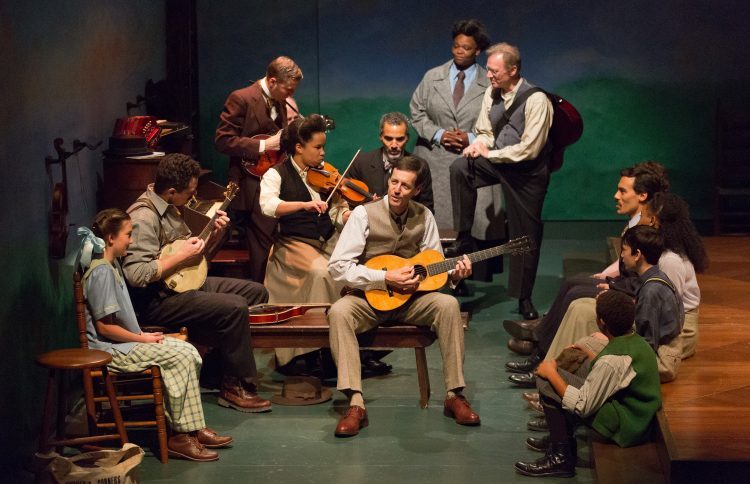
Our Town by Thornton Wilder. Peoples Light, Malvern Pa through August 25, 2019.
The new production of Our Town by Peoples Light is unique. The company is using the talents of singer-actor David Lutken, who has channeled Woody Guthrie and Johnny Cash previously on this stage, to infuse the saga with extra music.
Lutken and other cast members serenade audiences with pre-show and post-show sing-alongs of tunes that might have been familiar to the characters in the play. It’s not an original score, like the 1955 TV production where Frank Sinatra and Paul Newman sang Sammy Cahn-Jimmy Van Heusen songs such as “Love and Marriage.” Rather, Lutken performs nostalgic tunes that suggest the early 1900s.
Guthrie and Cash each had the persona of Everyman, embodying small town and rural working-class Americans, just like the narrator of Our Town. Thus this is an appropriate concept.
I am disappointed, however, that the production didn’t use such music as background during the story. The only musical addition to the play is a dance that bridges the wedding scene (the script’s Act Two) to the graveyard scene that playwright Thornton Wilder called Act Three. That music nicely accommodates the change of scenes.
The play unfolds as Wilder intended when it premiered at McCarter Theater in Princeton, New Jersey in January 1938. It is performed on an almost-bare stage with no curtain and no set, and the characters mime the objects which they supposedly are handling. The effect was startlingly original in 1938 and is arresting today too.
The play reinforced traditional American values at a time when this way of life was threatened by the rise of Nazi power. It celebrates love, family and community. Wilder wrote that his stage directions were essential to his plan: “When you emphasize place (his italics) in the theatre you drag down and limit and harness time to it. You thrust the action back into past time, whereas it is the glory of the stage that it is always ‘now’ there.”
He continued, “Our Town is not offered as a picture of life in a New England village. It is an attempt to find a value, above all price, for the smallest events in our daily life.” In other words, what we see on stage is supposed to represent all towns, all humanity.
Lutken’s straightforward performance encapsulates this simplicity. He guides us on visits to a town from 1901 until the First World War. Along the way, we enjoy performances by a gratifyingly large number of experienced, mature actors, including Peter DeLaurier as a funeral director, Benjamin Brown as Dr. Gibbs, Teri Lamm as Mrs. Gibbs, Graham Smith as Mr. Webb, Melanye Finister as Mrs. Webb, Andrew Kane as the milkman, Mark Lazar as a constable, and Michael Hicks as a choirmaster. Young’ns are played with naivete by Claire Inie-Richards, Josh Olumide, Lily Lexler and Caleb Ward.
Abigail Adams directs with naturalness. Period costumes are by Marla Jurglanis. Brent Hoyer manages the large number of sound effects.
One could quibble about some of the selections on Lutken’s song list, because they weren’t from the time period of this play. At least one of them pre-dated the drama by half a century. On the one hand, Wilder set his play in specific years; on the other hand, he aimed for universality and Stephen Foster’s tunes certainly have been sung in every decade since he wrote them in the 1850s. Either way, the music is excellent mood-setting.